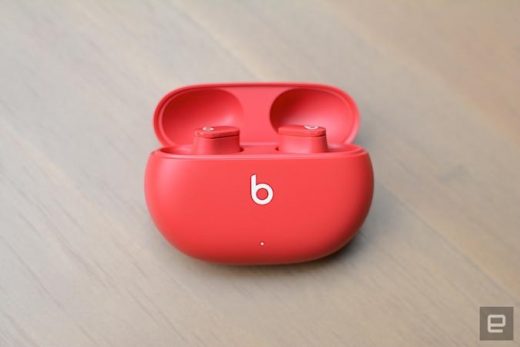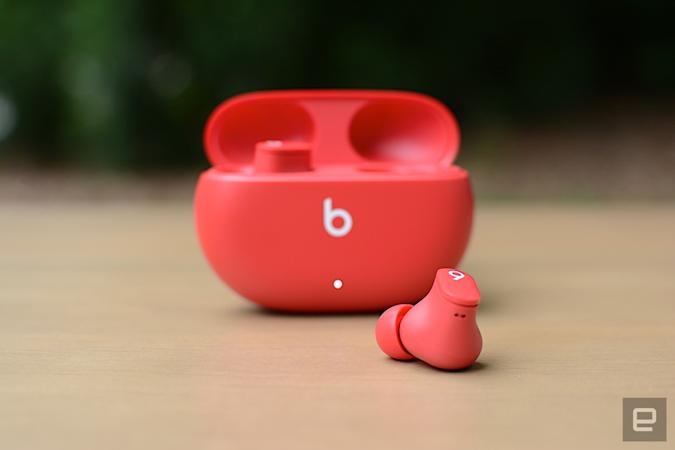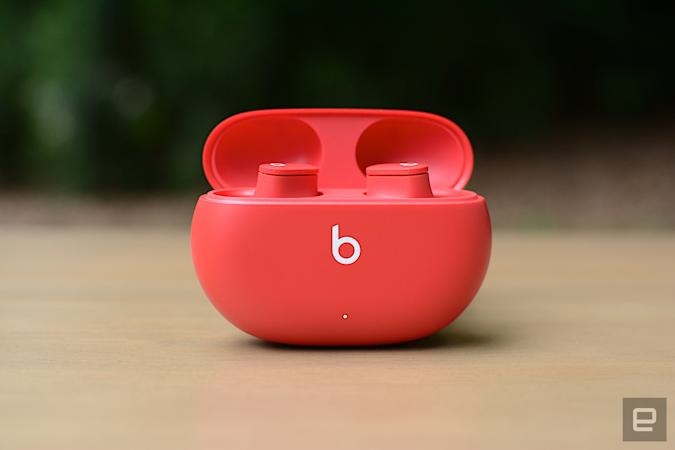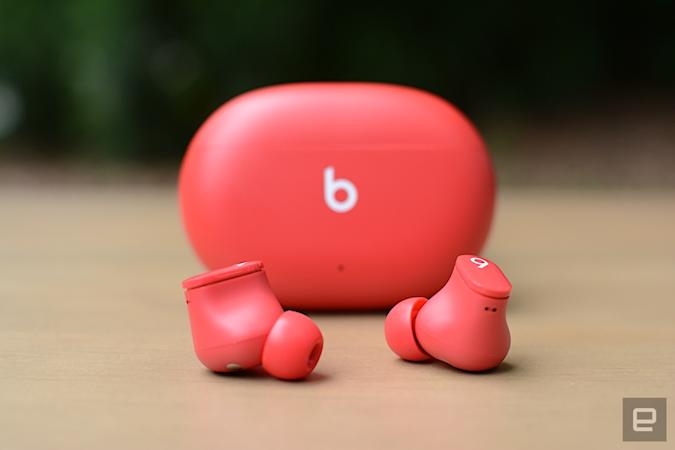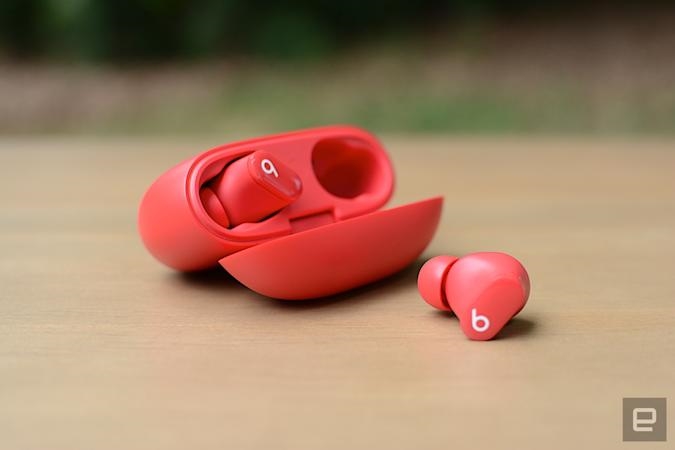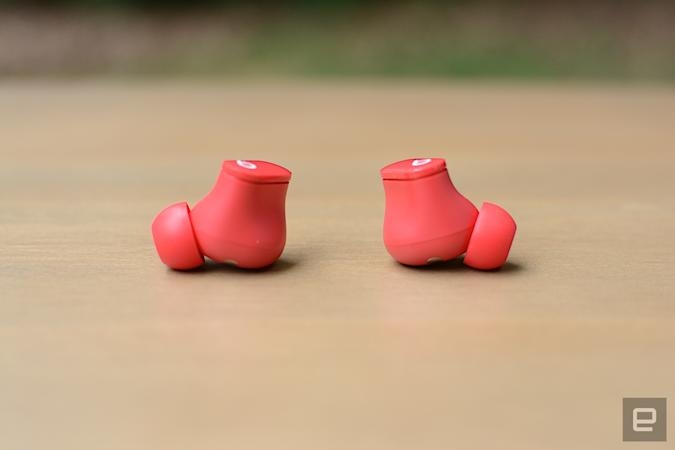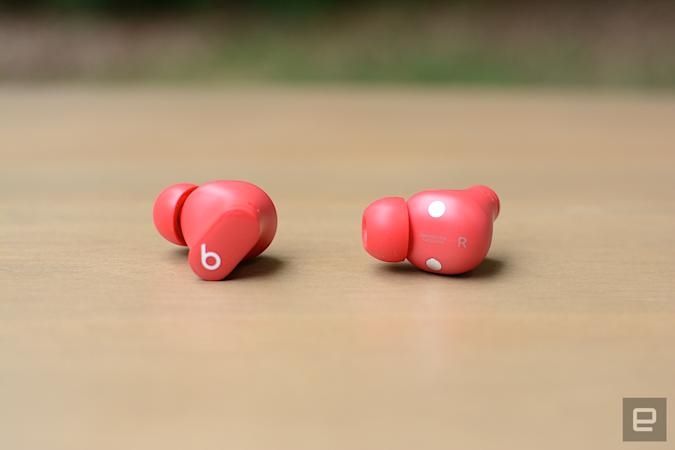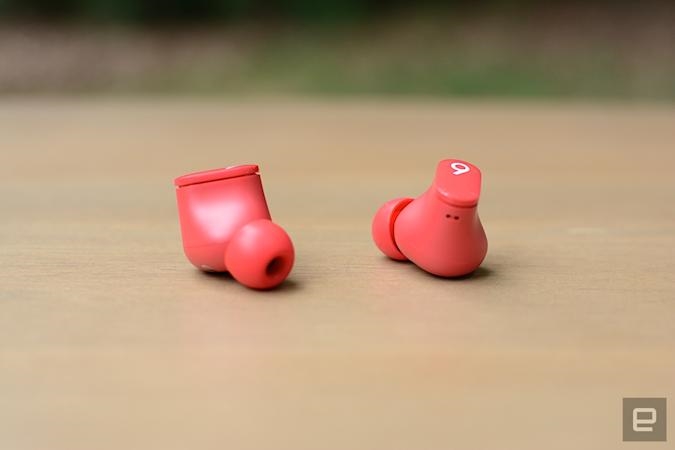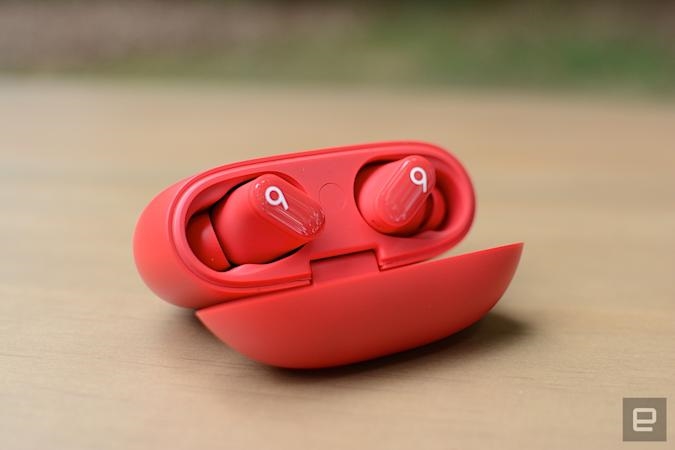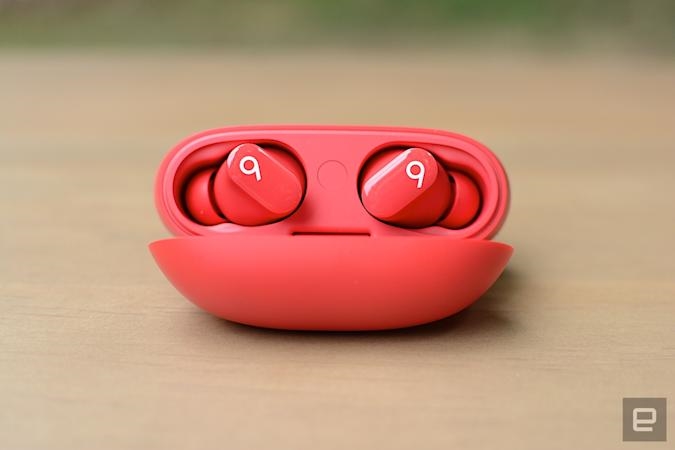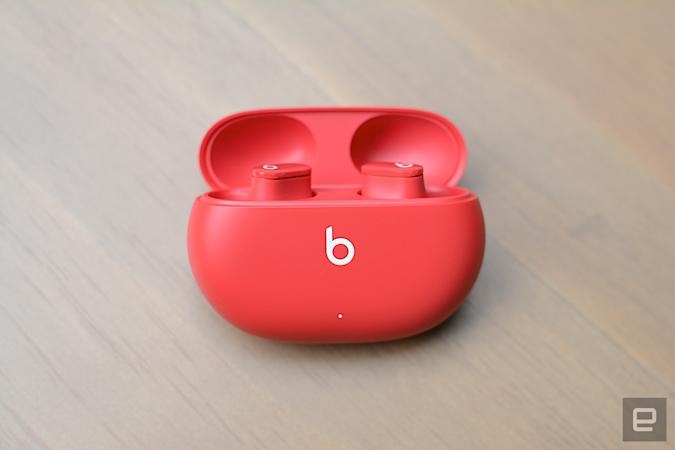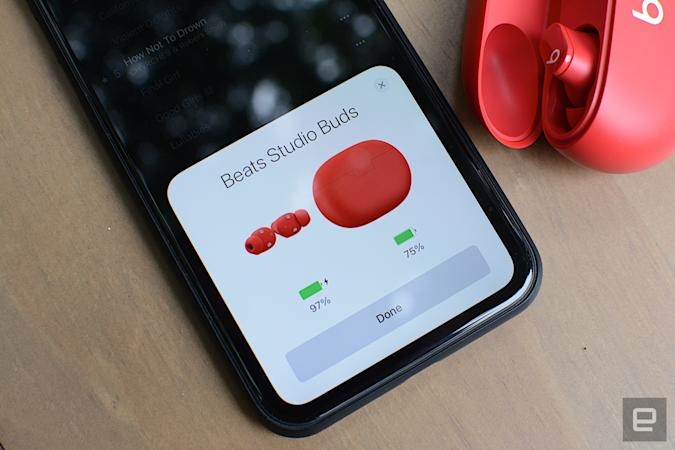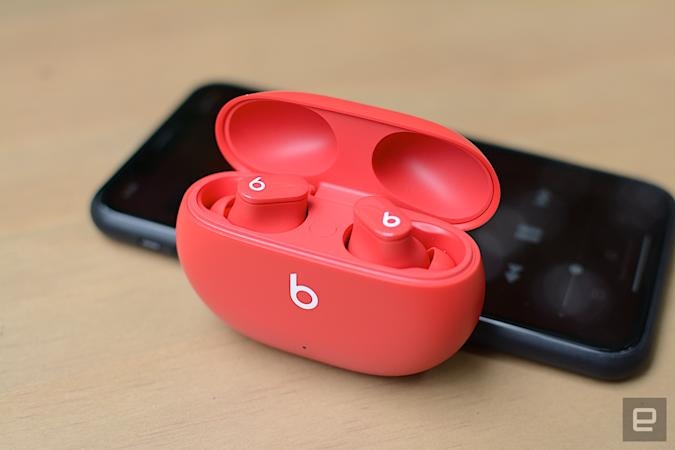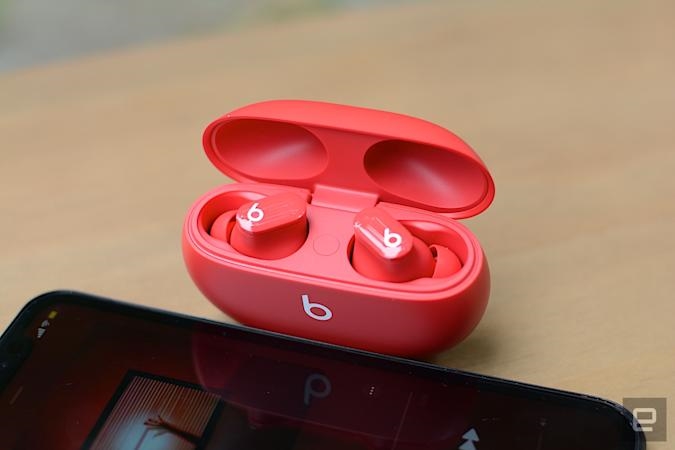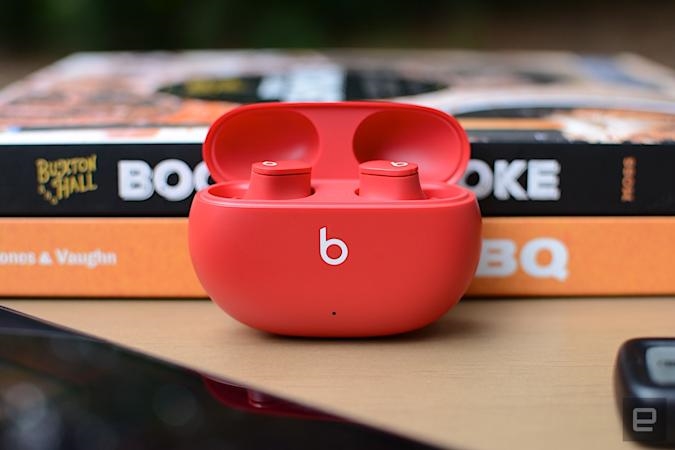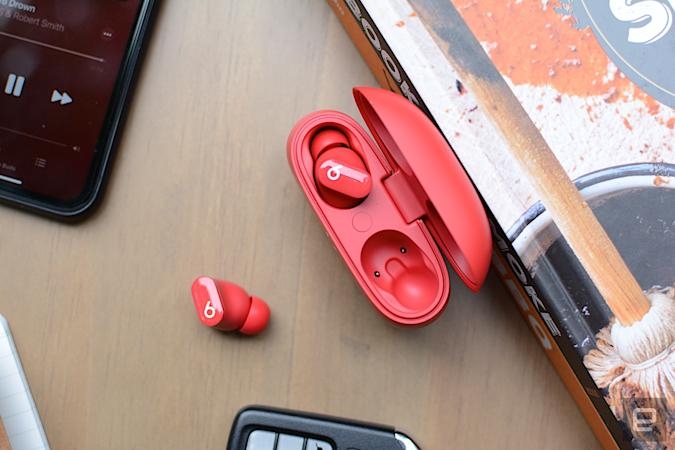Beats Studio Buds review: The Beats for everyone
Beats Studio Buds review: The Beats for everyone
Solid and affordable noise-cancelling earbuds with a few sacrifices.

Leaks have nearly spoiled a few big earbud announcements this year, and Beats’ latest was one of those. Even before high-profile athletes started posting pictures on Instagram wearing the unannounced devices, Apple’s iOS and tvOS betas tipped us off that new earbuds were on the way. Beats made things official today by announcing the Studio Buds: a set of noise-cancelling true wireless earbuds with an all-new design and a host of features. And perhaps most importantly, the company kept the price affordable at $150.
Gallery: Beats Studio Buds review
Gallery: Beats Studio Buds review
Design
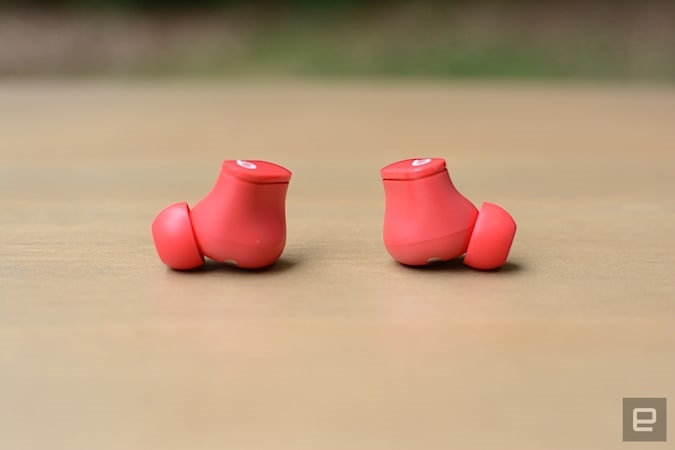
With the Powerbeats Pro, Beats went with an over-the-ear hook design that’s great for workouts. It’s not so great if you wear glasses or a hat. For the Studio Buds, the company chose a more “traditional” earbud shape with a round, water-resistant (IPX4) housing that neatly tucks in your ear. Rather than keep the outside control panel a circle, Beats made it a flat bar with its iconic “b” logo.
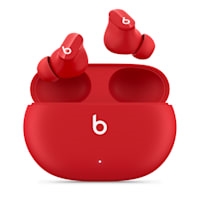
Pros
- Balanced sound
- Tiny and comfy
- Quick pairing support on Android and iOS
- Hands-free Siri
Cons
- Subpar call quality
- No on-board volume controls
- No wireless charging
- No options for customizing sound
That gives you something to grip when removing the buds from the case or adjusting them in your ears. However, the outer coating of the Studio Buds is glossy and slick. There were a few times I had trouble removing the earbuds from the case because I couldn’t get a good grip. Ditto for taking them out of my ears. You have to make sure you have a strong hold of them, otherwise your fingers tend to slip.
Just like previous Beats devices there are physical buttons for the on-board controls that click rather than a touch panel that accepts taps. It’s no surprise the company wouldn’t make the switch to touch controls on a mid-range set of earbuds. By default, the controls are mirrored on both sides, giving you the ability to play/pause (single press), skip tracks (double and triple press) and change the ANC settings (press and hold). All of these actions work reliably when you need them and don’t feel like you’re shoving them further into your ears. The only downside is that I regularly pressed the button and inadvertently paused my music when adjusting the buds.
The Powerbeats Pro case is absurdly large. It kind of has to be to accommodate the larger buds, but it’s bigger than nearly every other charging case I’ve tested. For the Studio Buds, Beats paired them with a compact, oval-shaped accessory with a flip-up lid on top and a USB-C port on the bottom. There’s a single LED on the outside that tells you if the set is fully charged or still charging. Inside the case, there’s a pairing button for when you need to connect to a device that doesn’t support iOS or Android’s fast-pairing features. The light on the outside will pulse when you’re in pairing mode.
Software
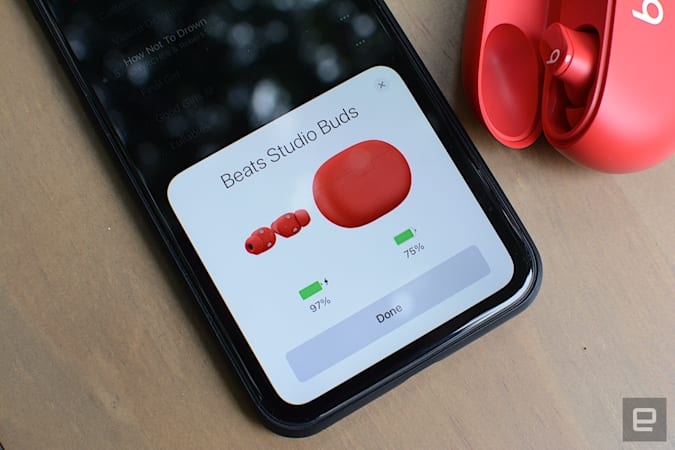
For the first time, Beats is offering Android users Fast Pair. Before now, the company’s ability to pair to your phone quickly was limited to iOS devices via Apple’s H1 chip. The Studio Buds are automatically detected by both iOS and Android devices simply by opening the lid. The first time you do so, you’ll see a pop-up asking if you want to connect and the process is completed with a single tap. The days of putting earbuds in pairing mode, swiping over to your settings, taping the device name and waiting for everything to sync are over. The only time you’ll have to put the buds in pairing mode is if you need to connect them to something like your laptop.
There’s another first from Beats for Android users that will help you find lost earbuds. Studio Buds work with both Apple’s Find My app and Find My Device on Android. Those will display the last known location where they were paired with Bluetooth and can play a sound when they are close by.
On iOS, the features for Studio Buds are already baked into the operating system. It’s very similar to how you access the settings for AirPods. In the Control Center, you can long press on the volume slider to pull up ANC controls (ANC, transparency, off). If you venture to the Bluetooth menu and tap the “i” next to the device name, you also have the ability to rename them and change what the long press action on the earbuds does. By default, it cycles between active noise cancellation, transparency mode and off, but you can also set it to activate Siri on one or both sides. The Studio Buds offer hands-free access to Apple’s assistant just by speaking though, so you probably skip that.
For Android users, the Beats app gives you access to the things that are native on iOS. That includes the secondary method for switching between ANC, transparency mode and both off in addition to reassigning the long press function. You also have the ability to quickly see battery levels and the software will also facilitate any necessary firmware updates in the future.
As is typically the case with Beats headphones, there’s no customization in terms of the sound. That means there are no presets or manual EQ sliders to adjust if you don’t like the default tuning. Thankfully, the company has massively improved its sound profile in recent years, and things are much more balanced than the bass-heavy early days.
Sound quality
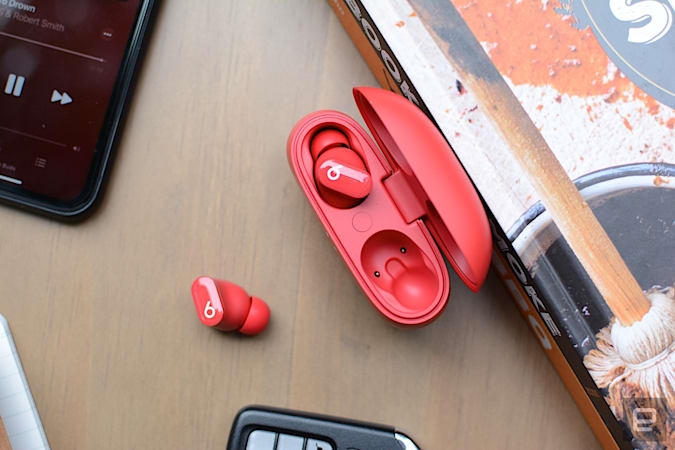
Studio Buds work with Apple Music’s new Spatial Audio that’s powered by Dolby Atmos. It’s activated automatically for any songs that are available in the immersive format. If you prefer for that not to happen you can turn Spatial Audio off in the settings menu of the Apple Music app. Earbuds may not be the best devices to employ this technology, but it’s available here nonetheless. Honestly, I’ve found some genres don’t benefit from the Atmos treatment. Kacey Musgraves’ Golden Hour, for example, was already produced to sound airy and atmospheric so I prefer it the “regular” way. This isn’t a knock on the Studio Buds, but be aware if you pair them with Apple Music you might want to disable Dolby Atmos at times.
For all of your non-Atmos music streaming, the Studio Buds are well-tuned with punchy bass that will certainly keep your energy up during a workout. The earbuds handle most genres with ease, giving hip-hop and electronic tracks deep, driving bass lines while keeping details in focus. Run The Jewels’ RTJ4 and Purity Ring’s WOMB are two good examples of this, where the low-end tone pluses underneath the vocals, synths and other instruments. The Studio Buds do well with rock and metal too, keeping grungy guitars, bass, drums and growling vocals separated rather than smashing them all together. You can really tell how far Beats has come when listening to bluegrass, where all the acoustic instruments have depth and presence, but the upright bass doesn’t drown out the rest.
Like other recent Beats headphones and earbuds, the company says its ANC tech is powered by an algorithm that scans source files “while simultaneously correcting and cleaning audio-compromising artifacts at up to 48,000 times per second.” The noise-cancelling feature also uses adaptive gain control that adjusts in real time to block external noise and wind. During my tests, the Studio Buds did a decent job blocking constant sounds like a dishwasher, dryer and white noise machine. They didn’t completely counter the roar of those items, but the did enough to reduce the distraction.
Transparency mode is a byproduct of the ANC setup, and it’s… fine. It pipes in the sound of your surroundings as advertised, for all when you need to be in tune with what’s going on around you. Unlike some of the competition, Beats doesn’t feed your voice back into the earbuds when you talk, so you’ll have to speak up to hear yourself. It’s not as “natural” as if the buds were picking up your voice, but transparency mode will certainly allow you to listen for your name in the office or when your cortado is ready at the coffee shop.
Call quality
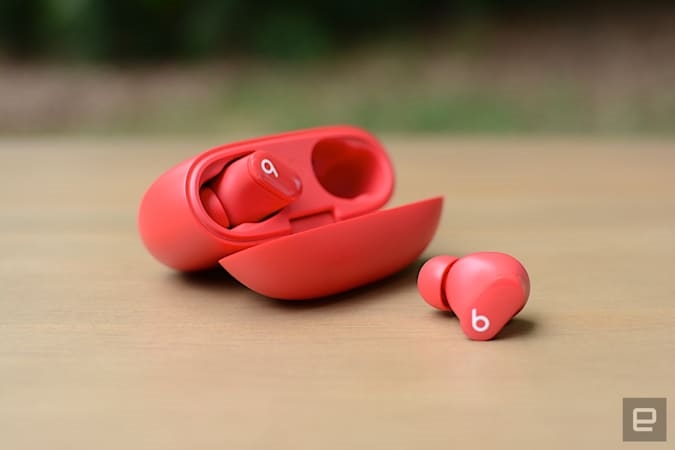
The Studio Buds offer independent connection via Class 1 Bluetooth. This means you can use either one of the earbuds on their own for things like calls. Since the controls are mirrored, you don’t lose access to anything if you’re only using one when your phone rings. Beats says the Studio Buds employ three microphones when you use a single earbud for calls and five when you’re using both. As is typically the case with true wireless devices, beam-forming mics focus on your voice and the feed-forward microphones monitor ambient noise to keep your voice the focus. The company says it also “recessed and thoughtfully placed” the mics to avoid wind noise and an algorithm monitors the internal mic to remove unwanted sounds.
That all sounds good on paper, but in practice what companies promise and actual call quality can vary greatly. With the Studio Beats, you can clearly hear background noise on the other end. Things like the television and a running dryer are easily picked up even when the person wearing them is speaking. Voice quality isn’t the best either. In fact, the person on the other end said my voice sounded clearer over speakerphone than when I was using these earbuds.
Battery life
With the Studio Buds, Beats is promising up to eight hours of battery life on a charge with ANC and transparency mode turned off. When you activate noise cancellation, that figure drops to five hours. That’s the standard these days for ANC earbuds. It’s also nice that you have the option of three additional hours if a situation demands it, where most of the competition only extends non-ANC play time by about an hour. During my tests, I managed just under the stated numbers, missing each by only about 10 minutes.
The included case offers two additional charges. So, if you’ve got ANC on, that’s a total of 15 hours between the earbuds and case, and when you turn it off that number increases to 24 hours. Beats has once again included its Fast Fuel tech on the Studio Buds, giving you an hour of use after a five-minute charge (ANC off). The one thing missing here is wireless charging, which still isn’t a standard feature on mid-range earbuds. Some companies offer it on earbuds that are around $150, but it’s not common.
The competition
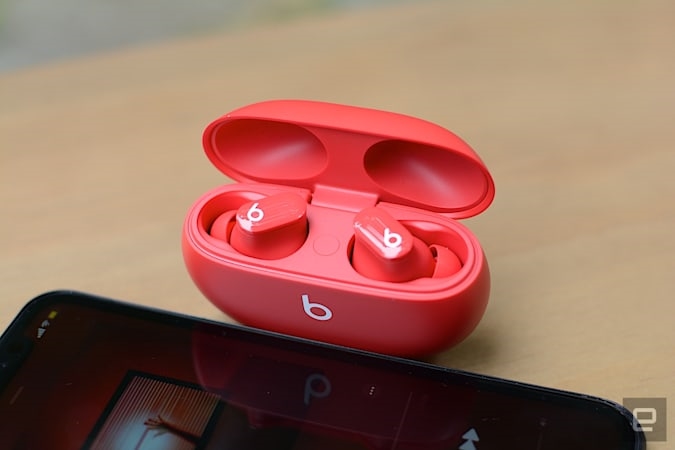
When it comes to alternatives to the Studio Buds, Beats has several of its own that may better suit your activity. At the top end, there’s the Powerbeats Pro with its hands-free access to Siri and great sound quality. However, like the wireless but tethered Powerbeats, the over-the-ear hook design isn’t for everyone. The Powerbeats Pro is available for around $170 these days — $30 cheaper than when it debuted in 2019. The Powerbeats offers many of the same features in a corded Bluetooth model for around $110. Beats also offers the $50 Beats Flex for users who favor saving money over a full set of features. Even with all those choices, the Studio Buds are the most discrete and offer the best mix of features for the price.
If you’re looking for a set of earbuds that work well with both Android and iOS, Samsung’s Galaxy Buds+ are a solid bet. They don’t have active noise cancellation and they’re only IPX2 rated, but they’re tiny and comfy with good audio and a host of other features like wireless charging. Plus, they’re available for around $100 — $50 less than the Studio Buds.
If you’re looking to save some cash without making too many sacrifices, Anker’s Soundcore Spirit Dot 2 is a highly capable set of true wireless earbuds. You’ll get small and comfy buds with punchy bass for $80. They’re also IPX7 rated, so they offer more protection against water and sweat than the Studio Buds.
Wrap-up
With the Studio Buds, Beats gives users yet another option in its crowded lineup of wireless earbuds. This is the company’s second true wireless model, and with a more “traditional” design, it’s the best choice from Beats for most users. You can still use these at the gym thanks to sweat and water resistance and both the basic on-board controls and hands-free Siri make things easy. Beats went further with the integration on Android this time around with things like Fast Pair and Find My Device. The sound quality is good for a set of mid-range earbuds and the ANC will do a decent job helping you combat distractions. At $150, you’re not sacrificing too much compared to a set of premium earbuds that will cost you twice as much.
The Beats Studio Buds are available to order today in the US and Canada in black, white and red for $150. The earbuds will begin shipping on June 24th.
(49)

